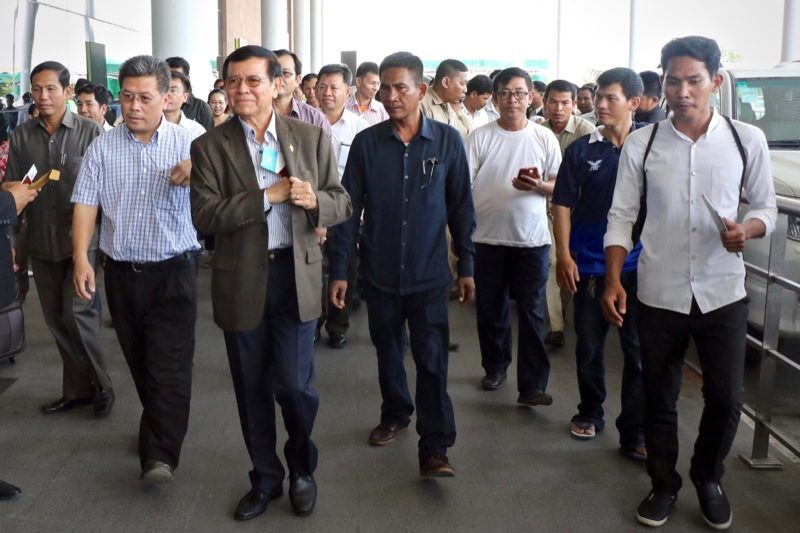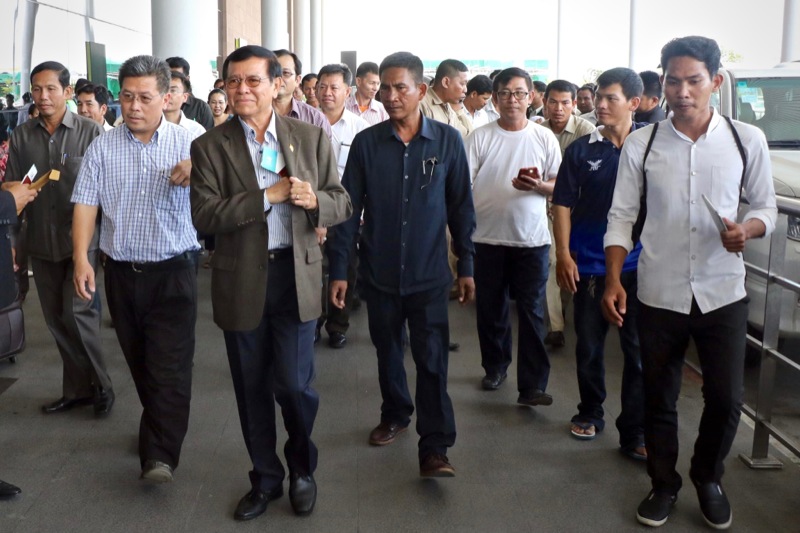Opposition leader Kem Sokha has lined up a series of meetings with U.S. officials over the next two days as the party seeks closer international scrutiny of upcoming elections and what it hopes could be the first democratic transition of power in Cambodia.
Currently in Washington, Mr. Sokha is set to meet with U.S. officials handling Asia issues for the National Security Council, State Department and Defense Department, as well as the chairman of the House Committee on Foreign Relations and other officials specializing in human rights and Asia, said Kem Monovithya, the CNRP’s deputy director of public affairs and Mr. Sokha’s daughter.

Ms. Monovithya said the meetings were an indicator of U.S. officials’ interest in the country’s—and region’s—affairs.
“It says two things: that the international community as a whole, including the US, see that big positive change is likely to happen in Cambodia soon, and that the US has strong interests in the region,” she said in a message from Washington.
“I hope to convey to the new administration what are at stakes with the upcoming historic elections in 2017/2018,” Ms. Monovithya added. “We need the highest level of attention from countries like the US during [these] unprecedented elections and the immediate transition (should there be one).”
After the CNRP pushed the long-ruling CPP to the brink during national elections in 2013, despite widespread reports of irregularities, the lead-up to local commune elections next month and national elections next year has been fraught with tension. Having held on to power since the 1980s—surviving a transition to democracy in 1993 as well as an armed clash between co-ruling parties in 1997—Prime Minister Hun Sen has vowed that “an internal war will erupt” if he were to lose to the CNRP in 2018.
He has also displayed increasing animosity toward the U.S., chastising it over its criticisms of Cambodia’s human rights abuses and canceling joint military exercises with the U.S. army and navy. The U.S. has long promoted democracy-building in Cambodia, pouring millions of dollars into political party training, public polls and other programs. But in recent years, Mr. Hun Sen has sidled up to China, which has lavished Cambodia with aid with no demands for the protection of human rights or democracy.
Mr. Sokha, who spent most of last year holed up in party headquarters to evade court action widely considered politically motivated, has been touring New Zealand, Australia and now the U.S. over the past few weeks, meeting foreign diplomats, parliamentarians and overseas Cambodian supporters.
On his list of scheduled interlocutors for today and Wednesday, according to Ms. Monovithya, are Representative Ed Royce, chairman of the House Committee on Foreign Relations; Matt Pottinger, the National Security Council’s senior director for Asian affairs, who is said to be a key point person for Asia policy in U.S. President Donald Trump’s administration; Susan Thornton, acting assistant secretary of state for East Asian and Pacific Affairs; Christian Whiton, special adviser for East Asian and Pacific affairs to the State Department and considered part of Mr. Trump’s inner team; and Randall Shriver, a leading candidate to be undersecretary of defense for policy.
CPP spokesman Sok Eysan, however, brushed off the opposition’s claim to have the ear of U.S. officials, saying he doubted that Mr. Sokha could gain an audience with anyone of significance.
“I think it’s just officials at the level of bureau chiefs who meet him,” Mr. Eysan said.
He added that the opposition always claims they will win the next election, but argued that the CNRP had already peaked in popularity.
With the launch of minor parties—including radio station owner Mam Sonando’s Beehive Social Democratic Party, Sourn Serey Ratha’s Khmer Power Party and former CNRP official Lak Sopheap’s Khmer Solidarity Party—the opposition is not as unified as in 2013, Mr. Eysan said.
“Those have brought along their supporters from the opposition, so it’s impossible for the opposition to win or even to keep the 55 seats at the National Assembly,” he said.
“There will be a big positive change in Cambodia, but not under the rule of the opposition party. There will be a big positive change under the leadership of the current ruling party, the CPP,” Mr. Eysan said. “It means it changes from peace into a very strong peace.”




